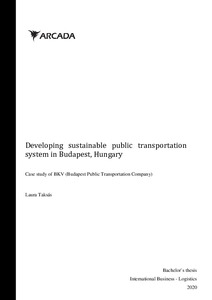Developing sustainable public transportation system in Budapest, Hungary
Taksás, Laura (2020)
Taksás, Laura
2020
All rights reserved. This publication is copyrighted. You may download, display and print it for Your own personal use. Commercial use is prohibited.
Julkaisun pysyvä osoite on
https://urn.fi/URN:NBN:fi:amk-202005118365
https://urn.fi/URN:NBN:fi:amk-202005118365
Tiivistelmä
This study is about developing a more sustainable public transportation in Budapest. Its exams the opportunities and the challenges Budapest’s public transportation company (BKV) has to achieve for providing a greener service.
Air pollution causes deaths of 7 million people worldwide every year. The starting point of solving this problem is redesigning the city’s transportation. The importance of sustainability and to change for greener public transportation can help to reduce emissions significantly.
Budapest as the capital city of Hungary has 1.776.361 inhabitants. Its transportation company serves 1.3 billion passengers throughout the year causing a fair amount of emissions making Budapest as one of the most polluted cities in the European Union. This gives the motivation and relevance behind the study and establishes the research question: What are the main challenges for Budapest to adapt to a more sustainable public transportation system? The aim of the thesis is to reduce emission and air pollution in Budapest.
Both qualitative and quantitative methods have been used in the form of interviews and a questionnaire, which have been analysed by SWOT and PESTEL tools.
The main challenges are mostly coming from political issues and pressures as a state company can be influenced by governmental changes. The organization needs to utilize the opportunities given and focus on doing green projects step by step in order to achieve its goal to be a sustainable firm providing environmentally friendly services. To find out if Budapest’s public transportation company manage to overcome these impedimental issues in the near future, I suggest further investigation in the matter.
Air pollution causes deaths of 7 million people worldwide every year. The starting point of solving this problem is redesigning the city’s transportation. The importance of sustainability and to change for greener public transportation can help to reduce emissions significantly.
Budapest as the capital city of Hungary has 1.776.361 inhabitants. Its transportation company serves 1.3 billion passengers throughout the year causing a fair amount of emissions making Budapest as one of the most polluted cities in the European Union. This gives the motivation and relevance behind the study and establishes the research question: What are the main challenges for Budapest to adapt to a more sustainable public transportation system? The aim of the thesis is to reduce emission and air pollution in Budapest.
Both qualitative and quantitative methods have been used in the form of interviews and a questionnaire, which have been analysed by SWOT and PESTEL tools.
The main challenges are mostly coming from political issues and pressures as a state company can be influenced by governmental changes. The organization needs to utilize the opportunities given and focus on doing green projects step by step in order to achieve its goal to be a sustainable firm providing environmentally friendly services. To find out if Budapest’s public transportation company manage to overcome these impedimental issues in the near future, I suggest further investigation in the matter.
